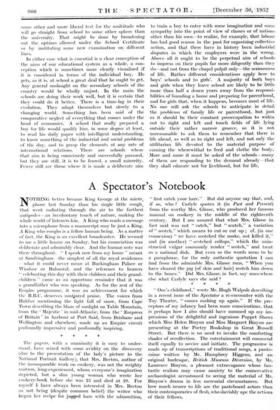The papers, with a unanimity it is easy to under-
stand, have seized with some avidity on the discovery (due to the presentation of the lady's picture to the National Portrait . Gallery), that Mrs. Beeton, author of the incomparable work on cookery, was not the weighty matron, long-experienced, whom everyone's imagination depicted, but a slim young woman who wrote her cookery-book before she was 25 and died at 29. For myself I have always been interested in Mrs. Beeton as not being (despite common belief) the writer who began her recipe" for jugged hare with the Sdnionition, " first catch your hare." But did anyone say that, and, if so, who ? Carlyle quotes it (in Past and Present) from the worthy Mrs. Glasse, who produced her famous manual on cookery in the middle of the eighteenth, century. But I am assured that what Mrs. Glasse in, fact said was not " catch," but " scatch," a variation of " scotch," which means to cut or cut up ; cf.(in one connexion) " we have scotched the snake, not killed it," and (in another) " scotched collops," which the unin- structed vulgar commonly render " scotch," and treat as a national dish. But even so the words seem to be a paraphrase, for the only authentic quotation I can find from the admirable Mrs. Glasse runs, " When you have cleared the pig [of skin and' hair] scotch him down to the bones." Did Mrs. Glasse, in fact, say somewhere . else what Carlyle says she said ?






























 Previous page
Previous page